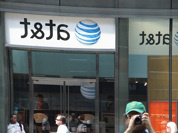AT&T Sends Bills To Collections Ten Days After They’re Mailed Out
<!– –>Reader Tom wrote in to let us know that during a conversation with AT&T customer service, a representative told him that it is typical to send out collection notices ten days after the original bill is mailed. Factoring in two or three days for the bill to arrive, two or three days for the check to get back to AT&T, and a Sunday or two, that leaves three to five days for customers to pay their bills before the angry letters and phone calls begin.
–>Reader Tom wrote in to let us know that during a conversation with AT&T customer service, a representative told him that it is typical to send out collection notices ten days after the original bill is mailed. Factoring in two or three days for the bill to arrive, two or three days for the check to get back to AT&T, and a Sunday or two, that leaves three to five days for customers to pay their bills before the angry letters and phone calls begin.
Tom’s email:
Hi Consumerist –
I recently disconnected my AT&T home phone and DSL service. I received a final bill in the mail shortly thereafter for $118. Checking the due date, I noticed that it says “due upon receipt,” and I thought, “Wow, I’d better run IMMEDIATELY to the nearest AT&T store and pay this bill because I received it 2 hours ago and IT’S ALREADY PAST DUE!”
Just kidding. What I actually thought is, “Due upon receipt, my big fat white ass.” And I scheduled it for payment 27 days later. Since AT&T was not capable of indicating a reasonable due date, I came up with my own, and for no particular reason, 27 days seemed about right. Seemed like the outer limit of right, but still right, still OK, still within reason.
Exactly three weeks after getting that bill, I received an extremely aggressive “collection” notice warning me that I was a delinquent and a menace to society. I honestly assumed I must have missed an earlier payment, because I couldn’t fathom receiving such an aggressive collection notice only 21 days after receiving a bill from a company I’ve never paid a day late in my entire life (I have perfect credit).
I called AT&T and was, indeed, transferred to their collections department. FANTASTIC. A collections specialist named Barry picked up and wanted to know if I’ve called to make a payment over the phone to settle this unpleasant matter. And I tell him, no, I did not. I tell him I’m calling to complain about getting a rude collection notice a mere 21 days after getting a bill.
And he says, “Sir, many times we send collection notices 10 days after the bill has been sent.”
And I say, “Wow, really? Doesn’t that seem kind of rude and stupid?”
And he says, “Sir, I apologize but apparently you are not on our schedule, and that’s when we send collection notices.”
And I say, “No, Barry, YOU are not on MY schedule, and when you fail to give reasonable and specific due-by dates, I make up my own.”
The Consumerist website has rightly counseled its readers never to be rude or disrespectful in situations like these, and I completely agree. I have always followed this advice and it’s worked well, and everyone should always follow it. You can’t always blame the underlings for the moronic and offensive decisions of its brainiac executives. There is never any excuse for abusive language, and nobody should every use it under any circumstances, ever.
But in this case I thought, screw it, enough with the executives hiding behind of the underlings who invariably tell me it’s not their fault. And I let loose with an offensive and totally inappropriate insult that surprised me even as I began to speak it.
[offensive and totally inappropriate insult]
My question is, what is the official Consumerist position on bills that are “payable upon receipt” for no reason other than vendor churlishness? Do your readers actually feel obligated to snap their heels, salute, and rush out a payment immediately? What’s a reasonable period of time?
We wrote back to Tom and said that we think a good due date would be a month since the last payment was made, assuming that one was sent on time. Ten days, especially when the above circumstances mean it’s actually half that, is not very reasonable, and if AT&T is calling these late payments or letting them affect customers’ credit scores, it is very unreasonable. But Tom asked our readers’ opinion, too, so what do you think?
(Photo: epicharmus)
Want more consumer news? Visit our parent organization, Consumer Reports, for the latest on scams, recalls, and other consumer issues.

